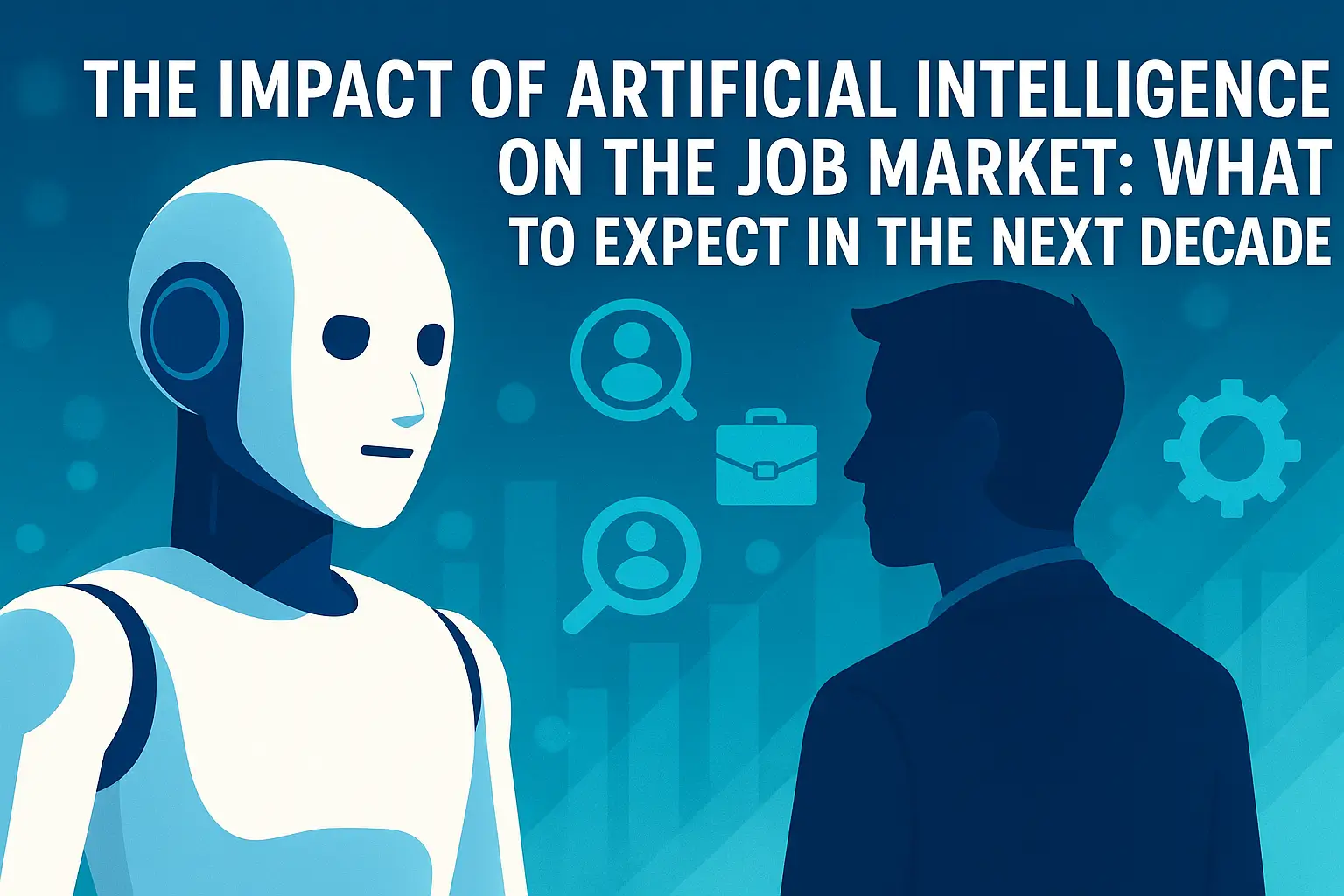Artificial Intelligence (AI) is one of the most disruptive technologies of our time. As it continues to evolve, its impact on the global job market is becoming increasingly significant. While some fear mass unemployment due to automation, others see AI as a catalyst for innovation, productivity, and the creation of entirely new careers. The next decade will be critical in shaping how AI transforms employment across industries.
In this article, we’ll explore how AI is influencing the job market today, which sectors are most affected, the types of jobs that are emerging, and what workers and employers can do to prepare for the changes ahead.
AI and Automation: A Double-Edged Sword
Automation—the use of machines to perform tasks previously done by humans—is not new. However, AI brings a new level of sophistication. With machine learning, natural language processing, and computer vision, AI can now perform cognitive tasks that were once thought to be exclusively human.
Job Displacement
AI is already replacing human roles in sectors that involve repetitive or predictable tasks. Examples include:
- Manufacturing: Robots perform assembly line tasks with speed and precision.
- Retail: Self-checkout kiosks and automated inventory systems reduce the need for human clerks.
- Customer service: AI chatbots handle queries, complaints, and appointment scheduling.
- Transportation: Autonomous vehicles threaten jobs in trucking and delivery.
According to a 2023 report by the World Economic Forum, automation could displace up to 85 million jobs by 2025. However, it’s important to balance this statistic with a more optimistic outlook.
Job Creation
AI is also a powerful job creator. The same WEF report predicts that 97 million new roles could emerge due to AI and automation. These roles often require a blend of human intelligence, creativity, emotional intelligence, and technical knowledge. Examples include:
- AI ethics specialists
- Data scientists
- AI trainers and model auditors
- Human-machine interaction designers
- Cybersecurity analysts
Sectors Most Affected by AI
While AI has a broad impact, certain sectors are experiencing more profound changes:
1. Healthcare
AI enhances diagnostics, streamlines administrative tasks, and supports personalized treatment plans. Radiologists, for example, now use AI to detect anomalies in medical images faster and with greater accuracy.
2. Finance
AI algorithms perform fraud detection, automate trading, and improve credit scoring. Financial analysts must now understand AI tools to remain competitive.
3. Legal Services
AI can review contracts, extract legal clauses, and conduct research in a fraction of the time. While it won’t replace lawyers, it changes the skills required in legal work.
4. Education
AI-powered platforms offer personalized learning experiences and automate grading. Teachers are shifting toward roles as facilitators and mentors rather than sole content providers.
5. Logistics and Supply Chain
AI optimizes delivery routes, forecasts demand, and manages inventories. Human roles are evolving toward logistics planning and AI system oversight.
Emerging Job Roles in the Age of AI
Here are some of the roles gaining prominence in the AI era:
AI Specialist
Experts who design, develop, and deploy AI algorithms and systems. They work in areas like deep learning, NLP, and robotics.
Machine Learning Engineer
Professionals who build and fine-tune machine learning models used in applications ranging from recommendations to fraud detection.
Data Scientist
They collect, clean, and interpret data, often using AI tools to find patterns and make predictions.
Prompt Engineer
A newer role focused on crafting effective inputs (prompts) for generative AI systems like ChatGPT or DALL·E.
AI Ethics Officer
Responsible for ensuring that AI systems are transparent, fair, and aligned with human values. They help mitigate bias and promote accountability.
Human-AI Interaction Designer
They focus on designing interfaces and workflows that optimize the collaboration between humans and AI systems.
Skills That Will Be in Demand
To thrive in an AI-driven job market, workers will need a mix of technical and soft skills. Here are key competencies to develop:
- Digital literacy: Understanding AI tools and data systems.
- Critical thinking: Analyzing information and making informed decisions.
- Creativity: Innovating in ways machines cannot replicate.
- Adaptability: Embracing change and continuous learning.
- Communication: Explaining complex AI-related concepts clearly.
- Ethical awareness: Understanding the implications of AI decisions.
Many institutions are now offering online courses, certifications, and bootcamps in these areas, making upskilling more accessible.
Strategies for Businesses and Governments
Organizations and policymakers must act proactively to ensure a smooth transition into the AI-driven economy.
For Businesses
- Invest in employee training to build AI literacy across departments.
- Integrate AI thoughtfully, focusing on augmenting rather than replacing human roles.
- Foster a culture of innovation that embraces experimentation and change.
- Implement fair hiring practices that consider transferable skills, not just AI experience.
For Governments
- Provide reskilling programs to support workers transitioning from obsolete roles.
- Encourage STEM education in schools and universities.
- Establish ethical frameworks for AI development and deployment.
- Offer tax incentives to companies that invest in responsible AI use.
A Look Into the Next Decade
The next ten years will likely bring a more symbiotic relationship between humans and machines. Some trends to watch include:
- AI-powered personal assistants becoming ubiquitous in the workplace
- Increased remote work enabled by intelligent collaboration tools
- Global talent pools connected through AI-driven hiring platforms
- Widespread gig and freelance opportunities supported by digital marketplaces
- AI mentors and tutors assisting with continuous education
Rather than a dystopian future where machines take over, a more realistic vision is one where AI supports human workers, frees them from mundane tasks, and enhances their capabilities.
Final Thoughts: Preparing for an AI-Powered Workforce
Artificial Intelligence will undoubtedly reshape the job market—but how it unfolds depends on the choices we make today. By embracing lifelong learning, developing in-demand skills, and fostering responsible innovation, workers and businesses alike can thrive in the AI era.
Change is coming, but with preparation, that change can be a catalyst for growth, equity, and new opportunity.
